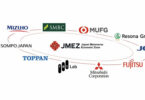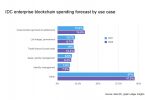Today IDC unveiled its 2019 predictions for worldwide digital transformation. Two of the ten predictions related to blockchain and IDC predicts a major impact by 2021.
The first blockchain prediction is: “By 2021, prominent in-industry value chains, enabled by blockchains, will have extended their digital platforms to their entire omni-experience ecosystems, thus reducing transaction costs by 35%.”
In the associated webinar, IDC Group VP Robert Parker spoke about how enterprises are starting to incorporate blockchain pilots into their digital transformation programs. 42% of companies have at least one active blockchain pilot. However, he noted that today many of these projects are led by one or two companies and gave examples of Walmart or Bumble Bee tuna.
“Beginning next year, 2019, we begin to see a transition to more consortia-based initiatives where whole value chains come together to take advantage of the immutable records and the distributed ledger capabilities in blockchain,” said Parker. “And this really represents an opportunity to take out a lot of waste in industry value chains by really reducing transaction costs.”
Parker stated that CIOs need to balance the priority of security with the need to share data within consortia and marketplaces. But CIOs should look for ways to reduce transaction costs within the consortia. However, given the scramble for talent, there’s a need to hire early.
Second prediction
The second IDC blockchain prediction is: “By 2021, about 30% of manufacturers and retailers globally will have built digital trust through blockchain services that enable collaborative supply chains and allow consumers to access product histories.”
This prediction is focused on benefits beyond the reduction in transaction costs. Parker commented that it ups the game on the customer experience.
“Consumers are increasingly skeptical that the claims made by retailers and consumer goods manufacturers are legitimate,” explained Parker. “What does ‘all natural’ mean? What does ‘sustainably sourced’ really mean? And there are some standards there, but there’s a lot of latitude.” Blockchain provides the opportunity for companies to validate the claims.
For example, Bumble Bee tuna enables fish to be traced from the fisherman through to the table at a Ruth’s Chris restaurant. Additionally, traceability has other benefits such as the reduced cost of recalls. And for high-value items there’s potential for anti-counterfeiting solutions.
The IDC guidance provided was the common one of start with a business need, rather than the desire to use blockchain. And try to remain technology agnostic within blockchain. Regarding any skills gap, collaborating in a consortium will help.
The webinar is available on the IDC website.






